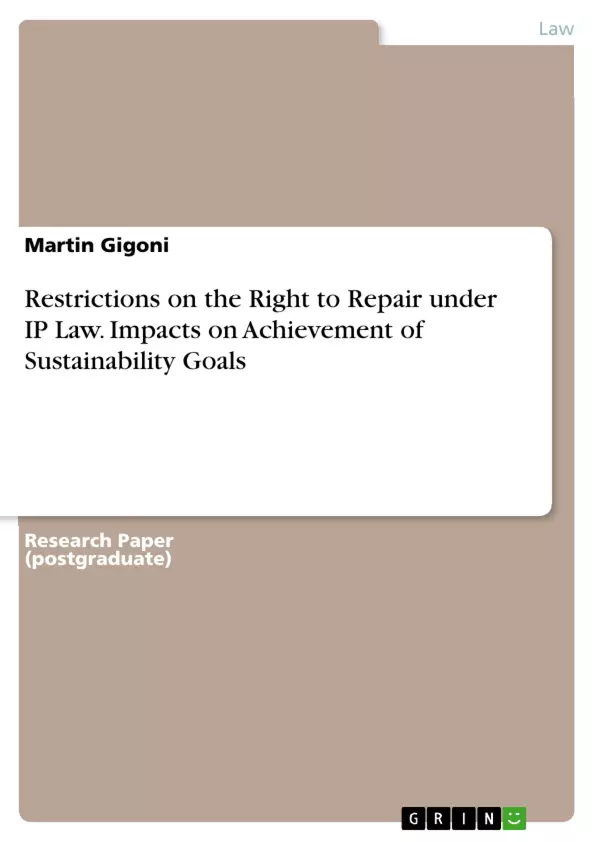This Paper argues that the EU needs to adopt a harmonised policy framework promoting the right to repair and limiting manufacturers’ use of IPRs on software to restrict repair rights which ultimately impacts the achievement of sustainability goals. Part B begins with the origins of the right to repair movement and its significance. Part C discusses restrictions on repair rights, including the role of IPRs. Part D discusses how the EU legal framework recognises repair rights and contrasts this with the Australian approach. Part E discusses the suggestions of scholars on reforms to the EU legal framework to better tackle restrictions on repair rights.
Modern electronics constitute not only the hardware in the device itself but also the embedded software that is critical to the device’s functionality. This software is usually pre-installed on the device by the manufacturer to run all its basic operations. This integration of software systems to devices, sometimes called the "softening of hardware", requires the intervention of intellectual property rights (IPRs) to delineate the blurry lines separating the device and its functional components in software. Consequently, manufacturers use IPRs on the embedded software to limit the consumer’s control over a device and effectively lock them out from doing basic repairs to restore functionality.
These limitations discourage many consumers from pursuing repairs in favour of purchasing new devices and discarding the faulty ones. The result is a linear model of consumption and a throw away culture contributing to large amounts of electronics waste (e-waste) disposed worldwide. In 2019, consumer electronics comprised 54 million Metric Tons of e-waste, with Europe contributing 12 million Metric Tons. Worse still, the effects of e-waste pileups have for decades flowed downstream from developed to developing countries.
In response, the European Union (EU) has focused on achieving a circular economy to reduce e-waste by extending the lifespan and usability of products through, inter alia, recognising the right to repair movement.
Inhaltsverzeichnis (Table of Contents)
- A. INTRODUCTION
- B. ORIGINS OF THE RIGHT TO REPAIR MOVEMENT
- I. Background Information
- II. Importance of the Right to Repair
- C. BARRIERS TO THE RIGHT TO REPAIR
- I. Notable Restrictions
- II. Role of IPRs in Restricting Repair
- D. TOWARDS A EUROPEAN RIGHT TO REPAIR
- I. EU Policy Framework
- II. Repair Rights in Australia
- E. SUGGESTED REFORMS ON THE EU FRAMEWORK
- F. CONCLUSION
Zielsetzung und Themenschwerpunkte (Objectives and Key Themes)
This paper examines the potential for a right to repair to limit intellectual property rights (IPRs) and thereby foster a more sustainable future. It focuses on the European Union (EU) context, arguing that a harmonized policy framework is needed to promote repair rights and limit the use of IPRs by manufacturers to restrict repairs.
- The origins and importance of the right to repair movement
- Barriers to the right to repair, including technological, legal, and physical restrictions
- The role of IPRs in restricting repair rights
- The EU's approach to repair rights and its comparison with the Australian model
- Proposed reforms to the EU legal framework to address restrictions on repair rights
Zusammenfassung der Kapitel (Chapter Summaries)
The introduction highlights the increasing reliance on embedded software in modern electronics, which has led manufacturers to use IPRs to limit consumer control over devices and discourage repairs. This trend contributes to a throwaway culture and the global e-waste problem.
Chapter B explores the origins and significance of the right to repair movement, which aims to empower consumers by providing access to spare parts, manuals, and repair tools. The movement is built on several pillars, including consumer access to repair tools, repair-friendly product designs, and the elimination of planned obsolescence.
Chapter C examines various barriers to the right to repair, including contractual restrictions in terms of service and end-user license agreements, as well as physical design constraints that make independent repairs difficult. The chapter also explores the role of IPRs in hindering repair rights.
Chapter D discusses the EU's policy framework for promoting repair rights and contrasts it with the approach adopted in Australia. The EU's efforts to achieve a circular economy are highlighted, along with the importance of recognizing the right to repair movement.
Chapter E presents suggestions from scholars on how to reform the EU legal framework to address restrictions on repair rights and promote a more sustainable approach to electronics.
Schlüsselwörter (Keywords)
The key terms and topics covered in this paper include the right to repair, intellectual property rights, software licensing, embedded software, e-waste, sustainability, circular economy, consumer rights, planned obsolescence, and EU policy framework.
- Quote paper
- Martin Gigoni (Author), 2023, Restrictions on the Right to Repair under IP Law. Impacts on Achievement of Sustainability Goals, Munich, GRIN Verlag, https://www.grin.com/document/1452306



